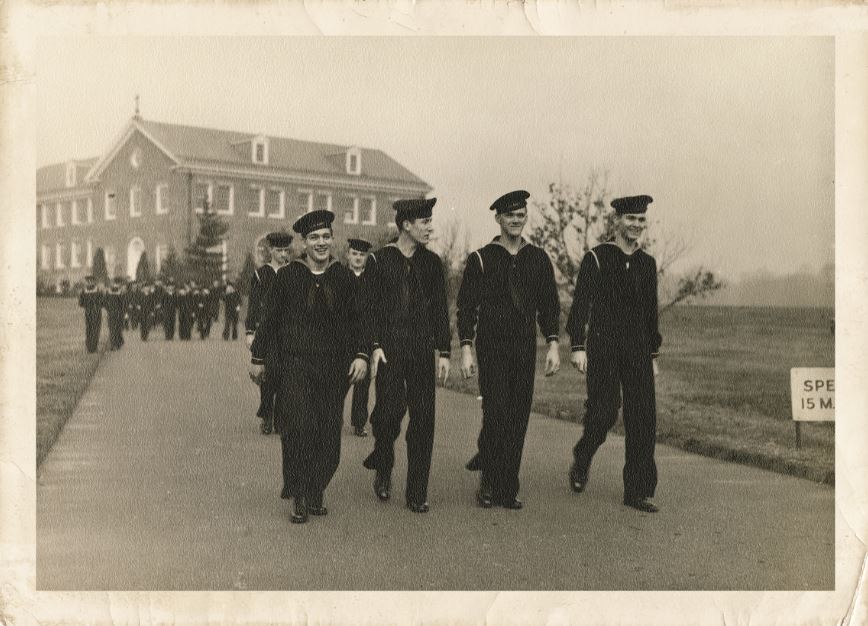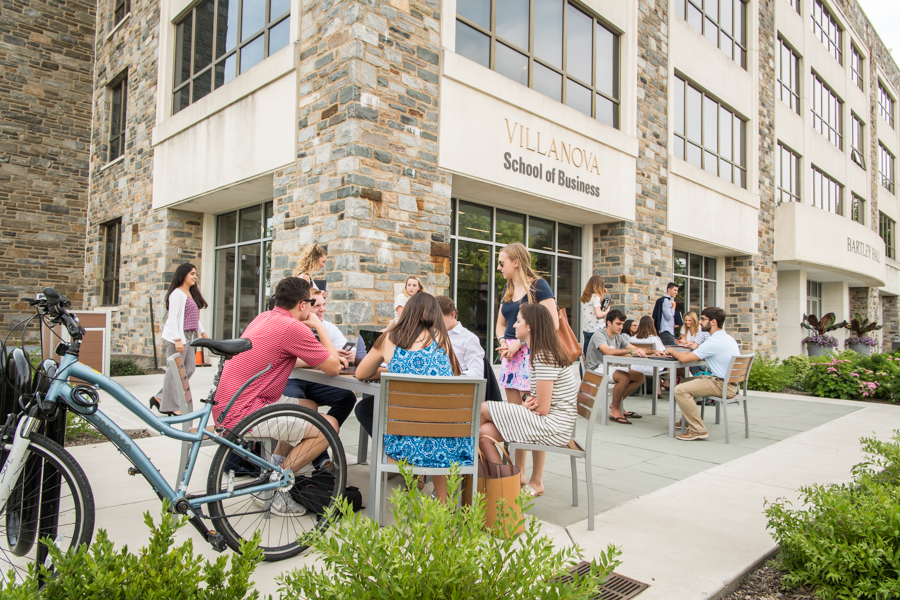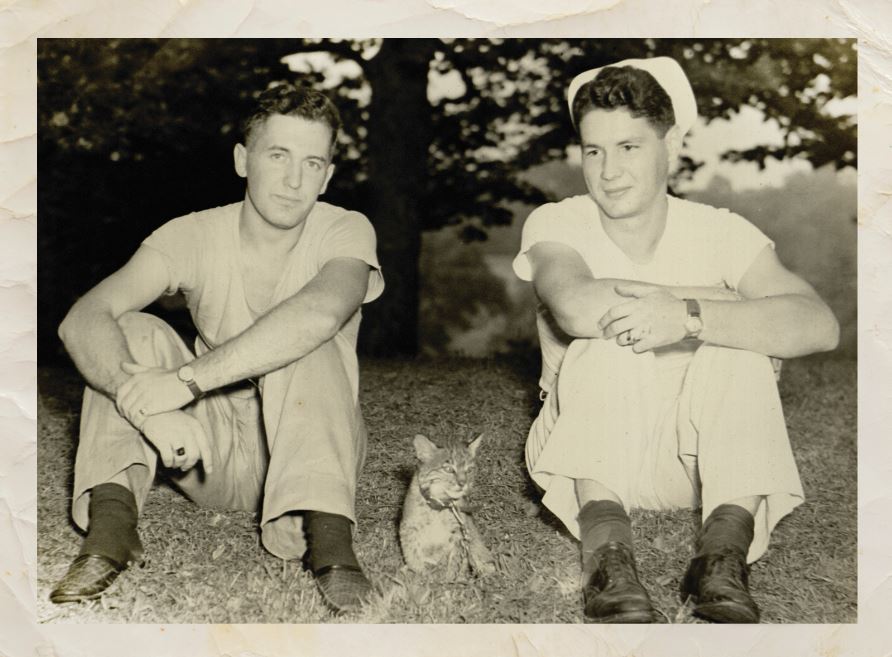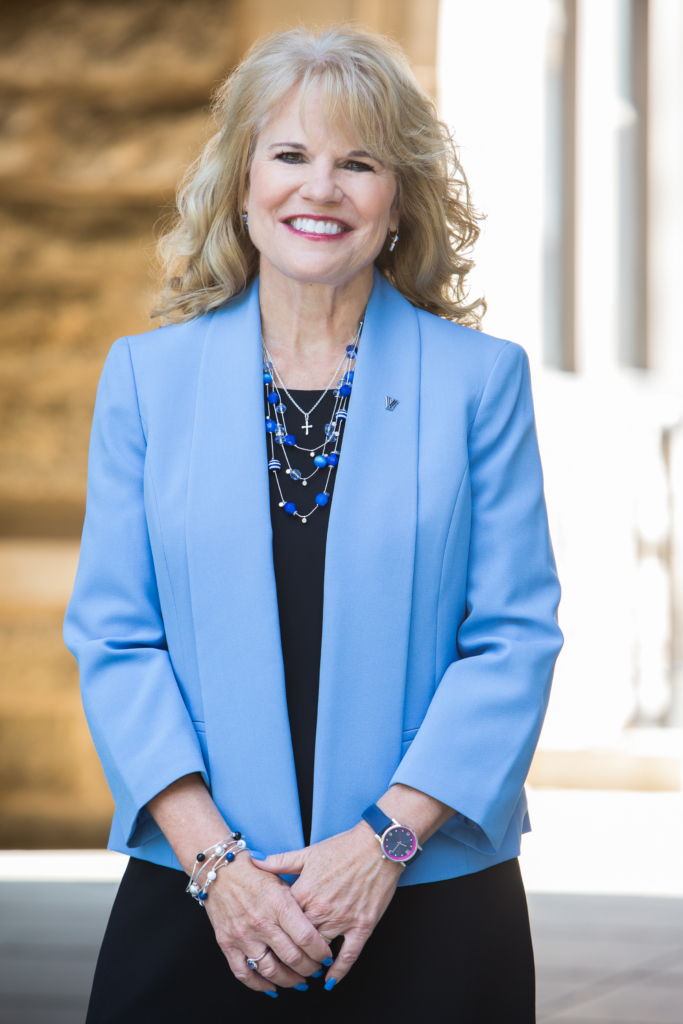
A group of male students walk in front of the Commerce and Finance building (now Villanova School of Business), erected in 1930. The building is now known as Vasey Hall. Courtesy photo
In 1922, when the very first students, on the very first day of classes, stepped inside the Villanova School of Business, they all looked strikingly similar: Nearly all were white, Catholic men.
One hundred years later, students arriving on campus have a very different makeup: Nearly 54% of them are women and more than 26% are students of color. They come from all socioeconomic backgrounds, ethnicities, and faiths.
Today (August 24), Villanova School of Business celebrates its 100th First Day, welcoming nearly 1,700 undergrads and 1,000 graduate students back to school with food trucks, swag, and notable guest speakers. Celebrations will congregate around a newly renovated Bartley Hall, the heart of the business school, named for the school’s first dean: The Rev. Joseph Bartley, who served for 40 years. It’s the official kick off to a year of events scheduled for VSB’s 100th anniversary, highlighting how the school has changed over the course of a century. (See a timeline of school milestones here.)
MORE WOMEN, MORE PEOPLE OF COLOR
When the nearly all white, all male, all Catholic class first enrolled in the new Division of Commerce and Finance (as VSB was then called), it wasn’t noteworthy for the time, or the place. Villanova College, founded in 1842, was named for its patron saint, St. Thomas of Villanova, and founded on Augustinian values to serve Catholic students. Many universities and business schools of the time didn’t allow women to enroll.

Students congregate outside the Villanova School of Business. Today, the school celebrates its 100th First Day of classes. Courtesy photo
Forty-six years after its establishment, in 1968, Villanova’s business opened applications to women. In 1972, four of them graduated, becoming the first female alumni in the school’s history.
Now it has its first female dean: Joyce E. A. Russell came to VSB on August 1, 2016, after serving as associate and vice dean at the Robert H. Smith School of Business at the University of Maryland-College Park. This will be her seventh year leading the school.
“When I first came, there were very few endowed professors or chairs who were women. We had a smaller percentage of women faculty, smaller percentage of women students. So we’ve really made concerted efforts to get more women into the business school as well as students of color,” she tells Poets&Quants.
In academia, women often get stuck as associate professors, Russell notes, and there’s ample evidence that women avoid applying for leadership positions unless they believe they are a near perfect match for the job.
“I have placed a number of women on my leadership team who were never leaders before, so I think the school certainly has transformed in that regard. We’ve really tried to say, “What are we doing to help you get yourself promoted?” We encourage women to look at their credentials, and put their name in if they’re qualified.”
100 YEARS OF MILESTONES
As it looks back on its first century, Villanova School of Business believes it has a lot to celebrate – not the least of which have occurred under the leadership of dean Russell, who implemented her five-year strategic plan in 2020.
Among its more recent milestones:

VBS students pose with Villanova’s first Wildcat, Count Villan. Courtesy photo
- The creation of its Office of Diversity, Equity, and Inclusion in 2018 and the appointment of marketing and law professor Aronte Bennett as the Associate Dean of Diversity, Equity & Inclusion in 2021. The school has hired 49 faculty with an emphasis on women and underrepresented groups.
- An undergraduate job placement rate of 98.9%, a 25% average salary increase for MBA students, and an alumni network of 31,550.
- A refashioned Part-Time MBA program starting this fall, offering more flexibility as well as a modernized curriculum.
- More than $40 million raised to support faculty research, DEI programming, scholarships for students, and building improvements.
Over the last decade, VSB has secured a $50 million gift, the largest ever for Villanova University, from alumnus James C. Davis ‘81, and several other multi-million dollar gifts from alumni and supporters. It established the first Center for Church Management at a business school, and it created a Master of Science in Church Management. It’s also added centers in commercial real estate, global leadership, professional development, multiple new degree programs, a new center for financial markets.
Poets&Quants connected with dean Russell to talk about women in leadership, 100 years of milestones, and what comes next for Villanova School of Business. Our conversation has been edited for length and clarity.
What is the significance of Villanova School of Business being led by its first female dean, in your opinion?
You know, I’ve been asked that question a lot. I’ve been in charge of a lot of different organizations where I’ve worked with women in leadership roles, and we talk about this: It’s not like you take the job for that reason. You certainly don’t even think about it, honestly.

Joyce E. A. Russell took over as dean of the Villanova School of Business on August 1, 2016. She is the first women to lead the school in its history. Courtesy photo
But I do think about it when alumni come back and say, “You know, I really wasn’t engaged with the school before, but now that you’re leading it, I’m engaged.” Or women students and prospective students who could go anywhere say, “I really saw that there are more women faculty here and that there are more women leaders.” I’m not saying that to pat myself on the back, it’s just that they’re excited about women in leadership positions. I recognize that it might not have been something I thought about, but I realize it’s a responsibility. I tell my daughter all the time that as a woman, you have to take the responsibility seriously and you have to recognize that it impacts other people. It’d be a lot easier not to be the first, but I think it’s important for people to see other people like them in leadership positions.
Besides mere visibility, why is it important for women and other underrepresented groups to have leadership positions?
I really think they can impact businesses and society. If you think about just the issues that employees face, you think about childcare issues, and the myriad responsibilities that women still assume in the family. I was doing a fireside chat with a female CEO, and she said one of the things that was very important to her was, you know, she would leave during the day and go watch her kids soccer games. She told people, “This is what I’m going to do.” She was letting them know that it’s okay to have a life.
I do think having a woman in leadership roles sometimes demonstrates an appreciation for some of the work-life issues that people experience. I think one of the issues facing our employees today, especially with the pandemic, is dealing with their work-life balance, and you have to have people in leadership roles who understand those issues.
It’s not just about seeing the role models. It’s about understanding the issues that our employees are facing, and then impacting the rules in organizations to accommodate people. It’s about saying your whole world is not just your job. We value the other things you bring to the table. We value the fact that you have families, and you’d like to see those families, or you have hobbies or leisure pursuits. Leaders who appreciate that an organization might need to have flex hours or flex days. These are real issues that people are facing.
I teach negotiations, and I think that knowing that women do not negotiate, that’s influenced how I behave. I want to ensure that the women I hire in faculty or staff are getting paid fairly, even if they don’t negotiate for themselves. I think if you have a greater appreciation for, you know, harassment, bullying, discrimination, tokenism, all those kinds of things, then you’re trying to create workplaces where those things do not exist.
Next page: 100 years of VSB milestones











Questions about this article? Email us or leave a comment below.